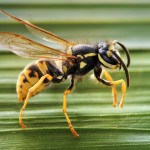 Most blogs have guest posts written by experts on a particular subject and this one will be no exception.
Most blogs have guest posts written by experts on a particular subject and this one will be no exception.
This is a guest post that was written by my mom. She has been highly allergic to bees for her entire life and for her, learning about bees and learning how to avoid them has been a necessary tool for survival. Here is what she had to say:
Bee stings are painful and nasty, but this is especially true for those who have a severe allergy to them. By bees I mean hornets, wasps, yellow jackets… any of the stinging group. I’ve put together a few pointers that just might save you from a painful attack, or maybe even save your life.
To avoid an unpleasant encounter with these winged warriors, try some of the following:
- Wear light colored clothing… tans, beiges, light greens or whites. Blacks and dark clothing attract them and make them more inclined to sting. Blue soothes them (or so I have been told).
- Avoid bright or patterned clothing as it attracts the bees.
- Do not wear anything scented such as perfumes, after shave, scented deodorants, etc.
- Cover all foods and drinks, they attract bees as well. (Bees love to hide in beverage cans!)
- Do not walk around camping grounds with bare feet – some species make nests in the ground, while others may just be wandering in the grass.
- If u carry an EpiPen, make sure it is not outdated and remember you only have about 20 minutes to get the patient to a hospital for more help.
- Bring a can of aerosol hair spray. If a bee should get inside the camper, spray it and within seconds it will be unable to fly due to the lacquer from the hair spray.
- Check bedding before getting into it or laundry you have hung out to dry.
- If you or your child are allergic to stings, get a medical bracelet or necklace stating your allergy to stings so people will be alerted. (This won’t scare the bees away, but it could save your life if you get stung.)
If you are not allergic, keep Benadryl on hand and calamine lotion to help soothe a bee sting.
::amazon(“B003JP28A8”)::If stung, do not squeeze the stinger once in your skin as this pumps more venom into your body…scrape it out gently with a credit card.
Watch for rashes or difficulty breathing… these are signs of severe allergy and require immediate attention. Please note that ambulances are equipped to handle this kind of situation as well.
I have been told that putting a penny on the sting will help I’ve also heard that keeping a dryer fabric sheet on you and other various “so called” deterrents will help keep the bees away. Since I have never tried them, I cannot recommend them. The best thing to do is be aware that there will be lots of bees around camping areas.
As the camping season reaches the late summer months, be mindful of the fact that bees will become more agressive as their hives become overcrowded and the food supply dwindles. Enjoy nature but be careful.
If you have any tips of your own, or remedies that you have used, please leave let us know in the comments. Thanks!

You must log in to post a comment.